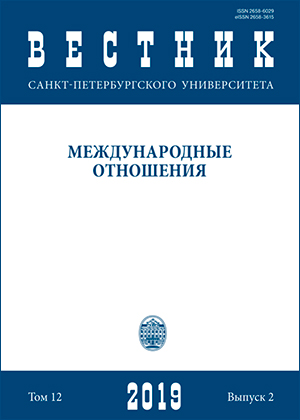Navigating the Ripple Effects: Brazil-China Relations in Light of the Belt and Road Initiative (BRI)
DOI:
https://doi.org/10.21638/11701/spbu06.2019.203Аннотация
The literature on Brazil-China relations has expanded rapidly during the past decade, but most of this scholarship has focused on bilateral channels or on the broad trends in how China's growing presence impacts politics, economics, and society in Brazil. Largely left out of this equation is how China's cooperation and competition dynamics within its own region shape its relations to Brazil. How does the promotion of the Belt and Road Initiative (BRI) affect Brazil's relations with China? This paper draws on official documents and statistics to analyze how the BRI affects Brazil´s relations with China along three dimensions: the economic, strategic, and political spheres. I argue that, despite the geographic distances separating Brazil from the Belt and Road Initiative, the initiative has concrete repercussions for Brazil's bilateral and multilateral dealings with China through a ripple effect emerging out of the BRI's spatial configuration. The paper also proposes that most of this impact is shaped by a ripple effect emerging out of the BRI's spatial configuration, although some components of the initiative, namely the Digital Belt and Road, are less anchored in geographic space. Brazilian researchers and policymakers must think beyond bilateral channels and consider how geopolitics and geoeconomics shape Brazil-China relations.
Ключевые слова:
Brazil, China, Belt and Road, South-South cooperation
Скачивания
Библиографические ссылки
Beccard, D. (2011), “O que esperar das relações Brasil-China?” [What to expect from Brazil-China relations?], Revista de Sociologia Política, vol. 19, pp. 31–44.
Mearsheimer, J. (2013), “Structural Realism”, in Dunne, T., Kurki, M. and Smith, S. (eds), International Relations Theories: Discipline and Diversity, Oxford University Press, Oxford, UK, pp. 77–93.
Acharya, A. (2018), The End of the American World Order, John Wiley & Sons, Hoboken, USA.
Cooper, A.F. and Pouliot, V. (2015), “How much is global governance changing? The G20 as international practice”, Cooperation and Conflict, vol. 50, no. 3, pp. 334–350.
Wade, R.H. (2011), “Emerging World Order? From Multipolarity to Multilateralism in the G20, the World Bank, and the IMF”, Politics & Society, vol. 39, no. 3, pp. 347–378.
Zhou, Z.Y. (2017), Achieving Food Security in China: The Challenges Ahead, Routledge, London, UK.
Bordachev, T. (2018), “Greater Eurasia and Russian Foreign Policy Priorities”, Asian Politics & Policy, vol. 10, no. 4, pp. 597–613.
Abdenur, A.E. and González, A. (2018), “Trans-Regional Cooperation in a Multipolar World: How is the Belt and Road Initiative Relevant to Latin America?” London School of Economics Global South Unit Working Paper 1, available at: http://www.lse.ac.uk/international-relations/assets/documents/globalsouth-unit/Working-Paper-No.-1.-2018-Adriana-Abdenur-and-Ariel-Gonz%C3%A1lez.pdf (accessed: 30.03.2019).
Huang, Y. (2016), “Understanding China’s Belt & Road Initiative: Motivation, framework and assessment”, China Economic Review, vol. 40, pp. 314–321.
The Observatory of Economic Complexity — OEC. Brazil, available at: https://atlas.media.mit.edu/en/profile/country/bra/ (accessed: 30.03.2019).
Pinheiro-Machado, R. (2018), Counterfeit Itineraries in the Global South: The human consequences of piracy in China and Brazil, 2017, Routledge, London, UK.
Ministério das Relações Exteriores. República Popular da China [Ministery of Internatnational Relations. People’s Republic of China] (2019), available at: http://www.itamaraty.gov.br/pt-BR/fichapais/4926-republica-popular-da-china (accessed: 30.03.2019).
Rabih, A.N. (2015), “Consequências do reconhecimento da China como economia de Mercado” [Consequences of the recognition of China as a market economy], ITCSD, 18 March, available at: https:// www.ictsd.org/bridges-news/pontes/news/consequ%C3%AAncias-do-reconhecimento-da-china-comoeconomia-de-mercado (accessed: 30.03.2019).
Abdenur, A.Е. (2017), “Skirting or Courting Controversy? Chinese FDI in Latin American Extractive Industries”, International Development Policy, vol. 9, pp. 174–198.
“No reason for ‘Tropical Trump’ to disrupt relations with China” (2018), China Daily, October 29, available at: http://www.chinadaily.com.cn/a/201810/29/WS5bd702e9a310eff303285424.html (accessed: 30.03.2019).
Bentes, P.M. (2019), “Bolsonaro tomou um golaço político da administração Trump” [Bolsonaro suffered a political goal from the Trump administration], Folha de São Paulo, March 24, available at: https://www1.folha.uol.com.br/mercado/2019/03/bolsonaro-tomou-um-golaco-politico-da-administracaotrump.shtml (accessed: 30.03.2019).
“Beijing insists BRI is no Marshall Plan” (2018), Financial Times, September 25, available at: https://www.ft.com/content/48f21df8-9c9b-11e8-88de-49c908b1f264 (accessed: 30.03.2019).
“China Belt and Road Initiative: Measuring the impact of improving transport connectivity on international trade” (2018), Rand Corporation, available at: https://www.rand.org/randeurope/research/projects/china-belt-and-road-initiative.html (accessed: 30.03.2019).
“Belt and Road Initiative” (2018), World Bank, March 29, available at: https://www.worldbank.org/en/topic/regional-integration/brief/belt-and-road-initiative (accessed: 30.03.2019).
Ministério da Defensa. Formado acordo entre Brasil e China no âmbito do Sistema de Proteção da Amazônia [Ministery of Defense. Agreement signed between Brazil and China on the Amazon Protection System] (2014), available at: https://www.defesa.gov.br/index.php/noticias/13189-firmado-acordo-entrebrasil-e-china-no-ambito-do-sistema-de-protecao-da-amazonia (accessed: 30.03.2019).
Ministério da Defensa. Brasil e China vão intensificar o intercâmbio entre militares [Ministery of Defense. Brazil and China set to deepen military exchanges] (2015), available at: https://www.defesa.gov.br/noticias/15534-brasil-e-china-vao-intensificar-o-intercambio-entre-militares (accessed: 30.03.2019).
“Exército Brasileiro busca maior intercâmbio com a China na area de Ciência e Tecnologia de Defesa” [Brazilian Army seeks greater exchange with China on Military Science and Technology] (2018), DefesaTV, December 3, available at: https://www.defesa.tv.br/exercito-brasileiro-busca-maior-intercambiocom-a-china-na-area-de-ciencia-e-tecnologia-de-defesa/ (accessed: 30.03.2019).
Загрузки
Опубликован
Как цитировать
Выпуск
Раздел
Лицензия
Статьи журнала «Вестник Санкт-Петербургского университета. Международные отношения» находятся в открытом доступе и распространяются в соответствии с условиями Лицензионного Договора с Санкт-Петербургским государственным университетом, который бесплатно предоставляет авторам неограниченное распространение и самостоятельное архивирование.




